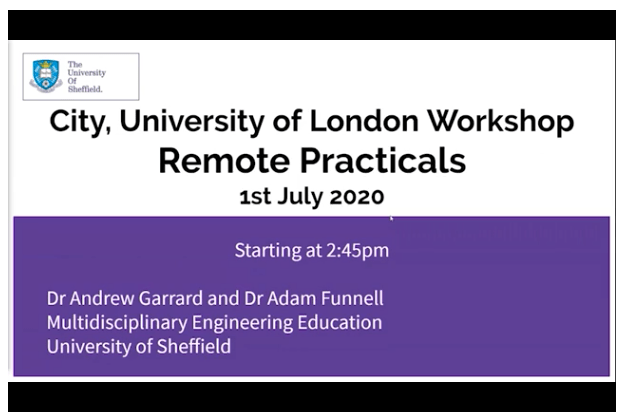Contents
Moving to remote practicals for Engineers
“We knew drawing on expertise from elsewhere in the sector would be necessary to help us to address this significant challenge at City, but Sheffield colleagues surpassed all our expectations by working with us to deliver a tailored workshop for our Engineering Department. We were very fortunate to be able to draw on both their expertise and their generosity of an approach to sharing”. Dominic Pates
This blog post describes how we (Taqveem Ahmed, Sandra Partington, Ali Press and Dominic Pates), worked collaboratively with colleagues from the University of Sheffield MEE (Multidisciplinary Engineering Education) to focus on how to deliver practical laboratory sessions online, or as we say Teaching Labs Online.
The request
During the unprecedented move to emergency remote instruction due to the coronavirus, one of the biggest challenges for SMCSE and a request we were presented with was identifying requirements, how to best support and replicate experiential learning opportunities in an online space. After an inspiring session at Advanced HE on virtualising Engineering labs by Dr Andrew Garrard (Deputy Head of Department) and Dr Adam Funnell, we knew we had to get the experts in to share some of their experience with us at City. On 1st July 2020, we invited Andrew and Adam to deliver a workshop on creating remote practicals for engineering.
Later in July, Dr Andrew Garrard and Dr Adam Funnell reflected on their experience of running the workshop at City University of London in their blog post, Remote Practicals – A Do-It-Yourself Workshop on their blog site Practical Engineering Education, which offers advice on teaching face to face as well as virtualised and remotely. We highly recommend you subscribe to this blog if you teach in labs.

The aims of the workshop
Sheffield University’s MEE department have extensive Engineering Laboratories at the Diamond building. Andrew and Adam have developed a learning outcome based approach to designing and virtualising Laboratory sessions. In this workshop, they shared their approach and tools and demonstrated how they broke down the problem of replicating labs online as well as sharing examples of how labs or parts of labs can be virtualised for learning.
How Sheffield and City worked together behind the scenes
Planning
We had a few online meetings in Microsoft Teams as the initial consultation of what we hoped to achieve from the workshop. Adam and Andrew highlighted the aim was not to just lecture and describe how we approached the challenge, but enable the attendees to follow thought processes by reflecting on their own teaching practice.
As we brainstormed ideas it was apparent that, for what we were trying to achieve, we would need breakout rooms to facilitate group activities and reflection from participants. As Adam and Andrew had previously run a similar session for Advance HE in Blackboard Collaborate Ultra, we thought this would be a great opportunity for ourselves and staff within schools to try out a new real time video conferencing tool.
Questions for Academics
Ahead of the workshop we had allocated participants to a group. We also requested participants to answer to two questions before the workshop. The initial responses were circulated to help them consider how these responses may be turned into Learning Outcomes. Participants were also asked to bring with them (virtually) their lab sheets for the second half of the session.
- Why do engineers need practical teaching (labs and workshops) as part of their programme?
- What do you hope your student will learn from practical teaching?
Workshop plan and edited recordings
Dominic Pates and Professor Rajkumar Roy introduced the session and key speakers for the ‘Learning in Labs in an Online Context’ workshop on 1st July 2020 via Microsoft Teams.
Part 1
Andrew Garrard delivered part 1 of the workshop which looked at Reviewing City’s practical learning outcomes/ reasons for practicals (LOs), as well as a comparison to Multidisciplinary Engineering Education (MEE’s) practical framework.
Attendees broke into groups to further discuss the learning outcomes from Task 1 and considered the tactics you would use to teach remotely and meet that learning outcome category.
Part 2
Adam Funnel delivered part 2 of the workshop which considered tactics to remotely deliver City’s practical learning outcomes, followed by a comparison to Multidisciplinary Engineering Education (MEE’s) collection of tactics.
Review of the event and early outcomes
The event was attended by 35 Staff, colleagues from Civil, Electrical and Mechanical engineering as well as Educational Technologists, Multimedia Designers and IT specialists, also including two external visitors representing Birkbeck University, London UK and KU Leuven, Belgium.
Sheffield helped us greatly, by volunteering their time and sharing their expertise. This has impacted positively on our planning for practical teaching both on site and remotely, by speeding up our thinking, by giving us reusable models and tools and by sharing experiences with peers with first hand subject and technical experience. We are more confident that we can cover practical teaching and thereby enrich student experience that might have been delayed or negatively impacted.
It is still early days for this academic year, but we expect to develop our remote and on site solutions with reference to Sheffield’s model.
Thank you
A big thank-you to our new friends at Sheffield, Andrew and Adam, and we hope to work with them again and one day to visit them and the Diamond.

